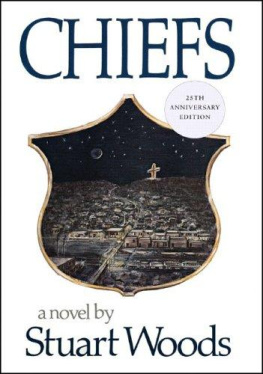BOOKS BY STUART WOODS
Fiction
A Safe House*
Criminal Mischief*
Foul Play*
Class Act*
Double Jeopardy*
Hush-Hush*
Shakeup*
Choppy Water*
Hit List*
Treason*
Stealth*
Contraband*
Wild Card*
A Delicate Touch*
Desperate Measures*
Turbulence*
Shoot First*
Unbound*
Quick & Dirty*
Indecent Exposure*
Fast & Loose*
Below the Belt*
Sex, Lies & Serious Money*
Dishonorable Intentions*
Family Jewels*
Scandalous Behavior*
Foreign Affairs*
Naked Greed*
Hot Pursuit*
Insatiable Appetites*
Paris Match*
Cut and Thrust*
Carnal Curiosity*
Standup Guy*
Doing Hard Time*
Unintended Consequences*
Collateral Damage*
Severe Clear*
Unnatural Acts*
D.C. Dead*
Son of Stone*
Bel-Air Dead*
Strategic Moves*
Santa Fe Edge
Lucid Intervals*
Kisser*
Hothouse Orchid
Loitering with Intent*
Mounting Fears
Hot Mahogany*
Santa Fe Dead
Beverly Hills Dead
Shoot Him If He Runs*
Fresh Disasters*
Short Straw
Dark Harbor*
Iron Orchid
Two Dollar Bill*
The Prince of Beverly Hills
Reckless Abandon*
Capital Crimes
Dirty Work*
Blood Orchid
The Short Forever*
Orchid Blues
Cold Paradise*
L.A. Dead*
The Run
Worst Fears Realized*
Orchid Beach
Swimming to Catalina*
Dead in the Water*
Dirt*
Choke
Imperfect Strangers
Heat
Dead Eyes
L.A. Times
Santa Fe Rules
New York Dead*
Palindrome
Grass Roots
White Cargo
Deep Lie
Under the Lake
Run Before the Wind
Chiefs
coauthored books
Bombshell** (with Parnell Hall)
Skin Game** (with Parnell Hall)
The Money Shot** (with Parnell Hall)
Barely Legal (with Parnell Hall)
Smooth Operator** (with Parnell Hall)
AUTOBIOGRAPHY
An Extravagant Life
travel
A Romantics Guide to the Country Inns of Britain and Ireland (1979)
memoir
Blue Water, Green Skipper
*A Stone Barrington Novel
An Ed Eagle Novel
A Holly Barker Novel
A Will Lee Novel
**A Teddy Fay Novel
A Herbie Fisher Novel

G. P. Putnams Sons
Publishers Since 1838
An imprint of Penguin Random House LLC
penguinrandomhouse.com

This work contains, in its entirety, Blue Water, Green Skipper by Stuart Woods, originally published by W. W. Norton & Company in 1977.
Copyright 2022 by Stuart Woods
Penguin Random House supports copyright. Copyright fuels creativity, encourages diverse voices, promotes free speech, and creates a vibrant culture. Thank you for buying an authorized edition of this book and for complying with copyright laws by not reproducing, scanning, or distributing any part of it in any form without permission. You are supporting writers and allowing Penguin Random House to continue to publish books for every reader.
Hardcover ISBN: 9780593188514
Ebook ISBN: 9780593190340
Cover design: Monica Cordova
Cover photograph: Dennis OBrien
Book design by Elke Sigal, adapted for ebook by Maggie Hunt
Penguin Random House is committed to publishing works of quality and integrity. In that spirit, we are proud to offer this book to our readers; however, the story, the experiences, and the words are the authors alone.
pid_prh_6.0_140138093_c0_r0
In loving memory of my mother, Dot, who gave me not just my life, but my life as a writer.
I miss her every day.
THE LAUNDERING OF SLIGHTLY SOILED LINENS
1
In the late 1920s, in Detroit, Michigan, a nineteen-year-old youth stood in court and, having been convicted of the crime of stealing sixteen cars, faced a judge for sentencing.
His name was Stuart Franklin Lee, and he had been in trouble for several years. He was born in Atlanta, Georgia, in 1907, to one Arthur Lee, son of a prosperous builder, and Annie Lee Jones, who had led a hard life.
Arthur Lee had served as his illiterate fathers bookkeeper, secretary, and assistant in his successful construction business, but when his father died, Arthur Lee was unable to hold the company together. He moved his family north, to Detroit, where he found work as a circulation manager for a large newspapera somewhat inflated title, since it meant that he was in charge of filling and collecting coins from a string of newspaper vending machines. Arthur began to drink.
Annie Lee Jones, a farmers daughter, had been orphaned at the age of six and, with her younger brother, Willie, sent to a childrens home where little Willie later died in her arms, apparently of institutional neglect. Annie Lees fortunes took a turn for the better when she was adopted by a St. Louis family named Chevalier. (Their Missouri neighbors had apparently been unable to handle the French pronunciation of their name, so they pronounced it Chev-a-LEER.) The adoption was not an entirely altruistic one. Annie Lee was put to work in the Chevalier household and, although she was treated kindly, especially by her adopted older brother, Stuart, she was little more than a servant.
Annie Lee and Arthur had three sons, Ohree, Stuart, and Brown, and a daughter, Palestine, called Pal. Although raised in a strict Baptist household by their mother, their father was not much of an example, and the boys became wild in their teens. They got away with vandalism, but soon they turned to joyriding in stolen cars. As a result, Stuart spent some time in a reformatory, where he managed to get himself charged with assault with intent to kill, for hitting a guard who called him a filthy name. The charges were later dropped. After his release he turned to car theft and, eventually, tried to pull off an armed robbery. Finally, Stuart was arrested, charged, and jailed. While awaiting trial he escaped from custody and was recaptured.
The family rallied around him, concocting an alibi that he had been at home on the evening of the crime, playing pinochle. The defense called his parents, brothers, and sister to the stand, and each of them related the alibi. Then, when the prosecutor confronted Stuart with evidence that they had lied and threatened to charge the whole family with perjury, Stuart changed his plea to guilty.
At his trial, when asked by the judge if he had anything to say for himself, Stuart replied, A mans got to have a car.
Not amused, the judge sentenced him to fifteen years in the Michigan state penitentiary.
His uncle, Stuart Chevalier, meanwhile, had become a prominent attorney in New York and Washington, specializing in tax law. Stricken with polio at the age of four, he walked on crutches, and as a young man he was told by his physicians that he had only a short time to live. His reaction was to write a reflective book,


















